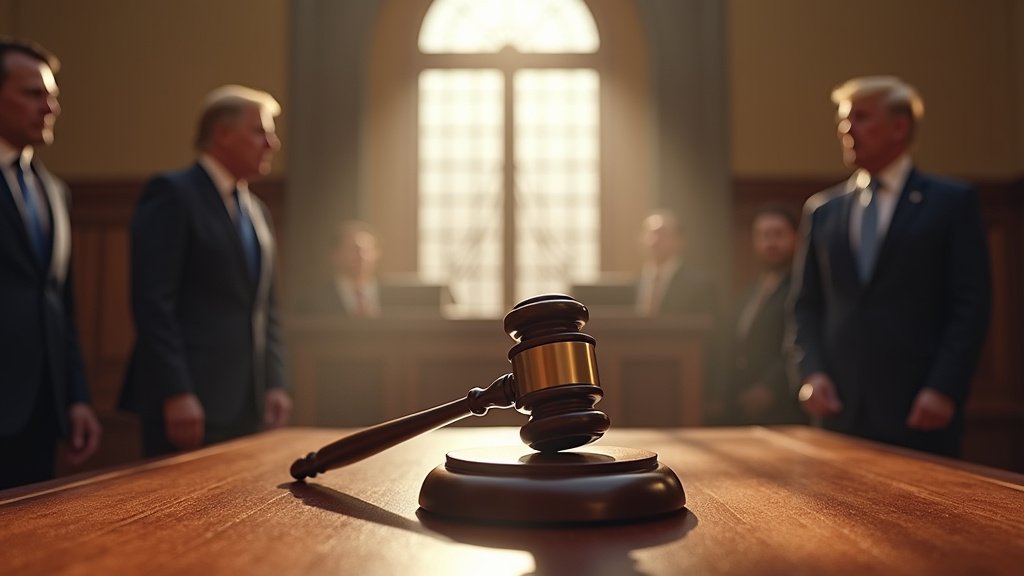The U.S. Supreme Court is set to make a pivotal decision regarding the Trump tariffs and presidential power, hearing arguments that challenge the legality of sweeping import duties imposed by the Trump administration. Oregon, leading a coalition of twelve states, argues that the President lacks the constitutional authority to levy such widespread import taxes, asserting that the power to impose tariffs is exclusively vested in Congress. This case, often referred to as the Trump Tariffs Supreme Court, will clarify the boundaries of executive power trade.
The Constitutional Clash Over Trump Tariffs and Supreme Court Authority
At the heart of this significant legal battle is the interpretation of the U.S. Constitution and statutes that have enabled presidents to impose tariffs. Article I, Section 8 of the Constitution explicitly grants Congress the power “to lay and collect taxes, duties, imposts, and excises.” However, successive administrations, including the Trump administration, have utilized laws such as the International Emergency Economic Powers Act (IEEPA) to impose tariffs, often citing national security or economic emergencies as justification. The administration argues that the broad authority to “regulate” commerce under IEEPA encompasses the power to impose tariffs, especially during declared national emergencies. The White House maintains these Trump tariffs are crucial for addressing trade imbalances and bolstering domestic manufacturing, a key aspect of presidential trade authority.
This expansive interpretation has faced significant opposition, leading to numerous lawsuits. Several lower courts, including the U.S. Court of International Trade and the U.S. Court of Appeals for the Federal Circuit, have previously ruled against the administration, finding that the use of IEEPA to impose these Trump tariffs exceeded presidential authority and was not intended by Congress for such sweeping actions. The Supreme Court has consolidated several of these challenges, including the Oregon tariff lawsuit, alongside suits from various businesses, all scrutinizing the Trump tariffs Supreme Court.
Oregon Leads the Charge: Economic Stakes in the Trump Tariffs Supreme Court Case
Oregon, a state with a deeply integrated global trade economy, is at the forefront of the challenge to the Trump tariffs. The state’s economy is heavily reliant on international commerce, with companies exporting over $34 billion and importing approximately $28 billion in goods annually. Industries crucial to Oregon’s economy, such as semiconductors, agriculture, and machinery manufacturing, depend on complex global supply chains for both inputs and markets. The implementation of widespread tariffs has already led to increased business costs, disruptions in supply chains, and uncertainty, prompting some companies to pass costs onto consumers or delay investments and hiring. The coalition led by Oregon includes states such as Arizona, Colorado, Connecticut, Delaware, Illinois, Maine, Minnesota, Nevada, New Mexico, New York, and Vermont, all arguing that the tariffs harm their economies and represent an overreach of executive power, making this a critical Trump tariffs Supreme Court issue.
Administration’s Defense and Judicial Skepticism on Trump Tariffs
Defending the Trump tariffs, the administration has presented arguments emphasizing national security and economic necessity, framing the tariffs as a vital tool for rebalancing trade and protecting American industries. The administration’s legal team has asserted that IEEPA grants broad authority to “regulate” imports during emergencies, a power they argue is essential for national defense and economic well-being. However, during oral arguments, some Supreme Court justices have expressed skepticism about the administration’s broad interpretation of presidential authority regarding the Trump tariffs. Justices have questioned whether Congress truly intended to grant the president unlimited tariff-making power through IEEPA, especially given that the Constitution explicitly assigns the power to tax to Congress. The “major questions doctrine,” which requires clear congressional authorization for actions of vast economic or political significance, and the “non-delegation doctrine,” which limits Congress’s ability to delegate its legislative powers, are also central to the legal debate surrounding the Trump tariffs Supreme Court.
The administration has also signaled that even if the Supreme Court strikes down the tariffs imposed under IEEPA, it possesses other legal avenues to maintain similar trade restrictions. Treasury Secretary Scott Bessent has stated that alternate laws, such as sections of the Trade Act of 1974 or the Tariff Act of 1930, could be invoked to reimpose duties. This suggests that regardless of the ruling on the Trump tariffs Supreme Court, tariffs are likely to remain a significant feature of U.S. trade policy, impacting congressional trade power.
Broader Implications for Presidential Power and Trade in the Trump Tariffs Supreme Court Ruling
The Supreme Court’s decision in this case carries profound implications beyond immediate trade policy and the specific Trump tariffs. It represents a critical test of the balance of power between the executive and legislative branches, particularly concerning Congress’s “power of the purse.” A ruling that upholds the administration’s broad interpretation of IEEPA could embolden future presidents to use emergency powers to bypass congressional oversight on a wide range of policy issues. Conversely, a ruling limiting presidential tariff authority could signal a move to reclaim congressional power in trade and economic matters, directly addressing the Trump tariffs Supreme Court.
The economic repercussions are substantial. The Trump tariffs have generated tens of billions of dollars in revenue for the federal government. Businesses, particularly importers and manufacturers, have faced increased costs, supply chain instability, and the difficult decision of whether to absorb these costs or pass them to consumers, potentially fueling inflation. For Oregon and other trade-dependent states, the outcome of the Oregon tariff lawsuit will shape the future landscape of their economic engagement with the rest of the world. The news from the Supreme Court will set a precedent for how presidential authority is exercised in international trade for years to come, a key element of the Trump tariffs Supreme Court scrutiny.
Conclusion on the Trump Tariffs Supreme Court Debate
The Supreme Court’s deliberation over Oregon’s challenge to the Trump tariffs is more than just a trade dispute; it is a fundamental examination of constitutional boundaries and the separation of powers, central to the Trump tariffs Supreme Court debate. As the justices weigh the arguments, the nation watches to see how the delicate balance between executive power trade and congressional prerogative in matters of taxation and trade will be defined, with significant consequences for both the U.S. economy and its place in the global marketplace. The Supreme Court tariffs decision will be keenly observed.




